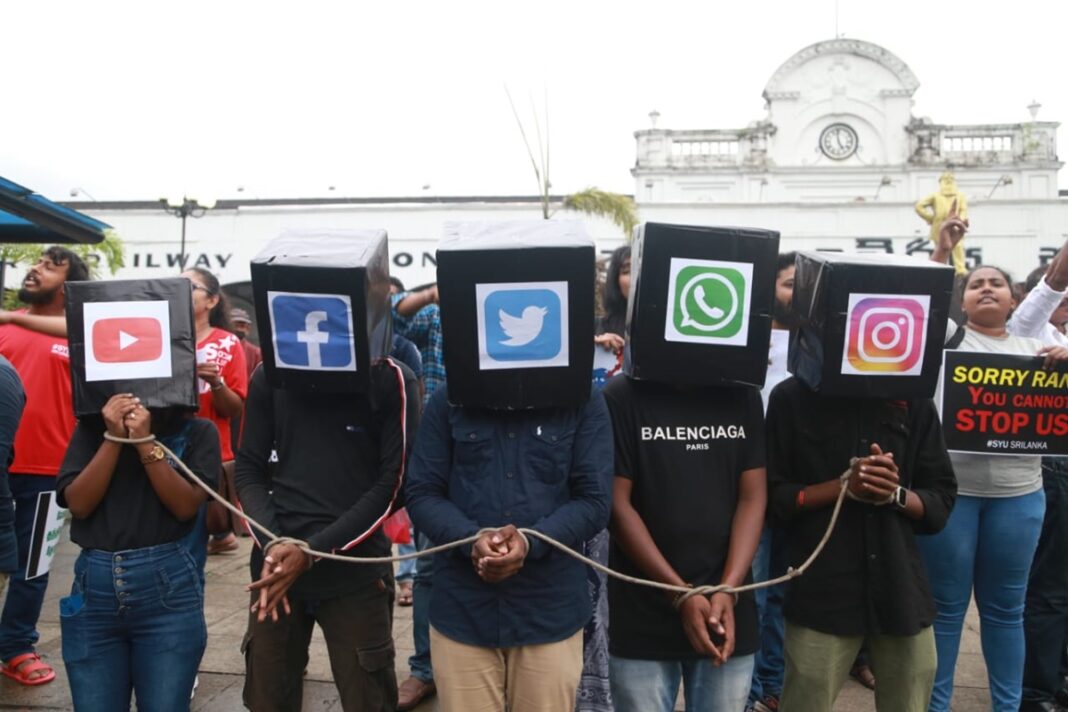
X: @sahanasometimes
As Sri Lanka prepares for a crucial parliamentary session on January 23, the Online Safety Bill proposed by Minister of Public Security Tiran Alas takes center stage, sparking fervent discussions and legal challenges.
The bill, unveiled on September 15, 2023, and presented to Parliament on October 3, has encountered significant opposition. Legal hurdles arose with 51 petitions challenging its constitutionality, resulting in a Supreme Court ruling allowing certain sections to proceed with a two-thirds majority, as outlined in Article 84(2) of the Constitution.
The Online Safety Bill aims to establish the Online Safety Commission, tasked with regulating online communication in Sri Lanka. The Commission, comprising five members appointed by the President for a three-year term, requires members with expertise in various fields, including information technology, law, governance, journalism, and science. Empowered to issue directives, the Commission can instruct individuals, service providers, or internet intermediaries involved in disseminating prohibited statements to allow affected parties the opportunity to respond. Additionally, the Commission holds authority to issue notices to internet service providers or intermediaries, mandating the removal or blocking of online locations featuring prohibited statements accessible to end users in Sri Lanka.
International and local organizations argue this poses a significant threat to freedom of expression in online spaces. The legislation grants the authority to define, regulate, and prosecute the production or publication of ‘false statements.’ This Online Safety Commission would have the power to order the removal or restriction of statements and sites, with potential investigations and prosecutions. Journalists and media workers may face imprisonment or substantial fines for violating the act.
The Human Rights Commission of Sri Lanka stressed the need to strengthen law enforcement capacities before legislating online criminal offenses.
The International Commission of Jurists (ICJ) called for evaluating the bill alongside existing laws, expressing concerns about threats to human rights.
The ICJ’s analysis delves into critical flaws within the bill, pointing to the wide-ranging powers vested in the proposed Online Safety Commission and appointed experts. It criticizes the bill’s provisions as overly broad, with concerns about the Commission’s discretionary authority and its potential encroachment into judicial functions. Furthermore, the bill lacks provisions for judicial review, raising questions about accountability.
Vague and overbroad definitions of offenses within the bill draw significant criticism. The ICJ points out that prohibitions listed in the legislation go beyond the restrictions allowed under international and Sri Lankan law. Concerns are raised about clauses targeting false statements that pose a threat to national security or public order, with potential repercussions for freedom of expression.
The ICJ also highlights the disproportionate punishment outlined in the bill, including hefty fines and imprisonment for ill-defined offenses. The lack of clarity on compliance directives and the potential for severe penalties raise fears of governmental overreach and censorship.
The Free Media Movement of Srilanka (FMM) strongly urges the government to reconsider and withdraw the Online Safety Bill, emphasizing the importance of preserving freedom of speech.
The Federation of Media Employees’ Trade Unions (FMETU) of the island nation condemns the proposed draconian bill, viewing it as a threat to the basic right to information and social freedom, particularly in the context of the growing economic, social, and political crisis in the country.
The Sri Lanka Working Journalists Association (SLWJA) expresses concern that the Online Safety Bill poses a significant threat to the fundamental right to freedom of speech and expression guaranteed by Article 14(1)(a) of the Constitution. They contend that the Bill’s provisions are overly broad and may exceed what is necessary to achieve its objectives, potentially infringing on these fundamental rights.
The International Federation of Journalists (IFJ) states that the Online Safety Bill, if passed, would be in clear violation of Sri Lanka’s constitutional commitments to fundamental human rights. The proposed Commission, entirely controlled by the President, is seen as contrary to the self-regulating media system necessary for true press freedom. The IFJ strongly urges Sri Lankan authorities to withdraw the proposed legislation and engage with media and legal stakeholders in its consultation processes.
The Bar Association of Sri Lanka voiced worries about the Online Safety Bill and the Anti-Terrorism Bill, fearing significant impacts on liberty, freedom, democracy, and the rule of law. The Asia Internet Coalition emphasized the importance of legislation not hindering innovation or restricting public discourse. The UNHCR conveyed concerns to the Sri Lankan government, and the Sri Lanka Press Institute warned about threats to freedom of speech.
Expressing the concerns, the UN Office of the High Commissioner for Human Rights (OHCHR), stated that the bill grants authorities’ expansive powers, potentially imposing restrictions not in line with international human rights law. OHCHR highlighted vaguely defined terms and offenses, leaving room for arbitrary interpretation, potentially criminalizing legitimate expression and chilling freedom of expression. The International Commission of Jurists emphasized the need to evaluate the bill in conjunction with existing and proposed legislation, warning of threats to human rights.
In response to the bill, 51 petitions challenging its constitutionality were filed in the Supreme Court. The court’s determination, submitted to parliament, found 31 clauses inconsistent with the constitution, suggesting amendments for a simple majority passage. The Attorney General submitted about 62 amendments during the court hearing. Concerns were raised that these amendments deviated from the bill’s merits and principles.
Concerns persist as the Supreme Court’s role is limited to examining constitutionality, allowing the parliament to pass it with a special majority. The possibility of introducing new amendments after January 23, 2024, raises challenges, and once passed, there is no judicial review within the Sri Lankan legal system.
In response to the publication of the bill the Centre for Policy Alternatives (CPA) has expressed profound concerns regarding various clauses of the Bill. These concerns were initially conveyed through a series of infographics issued on September 22, 2023, emphasizing potential threats to fundamental rights and democratic values in Sri Lanka.
CPA underscores the critical need for frameworks that ensure the safety of individuals and groups, particularly children and women facing increased vulnerability to online threats. However, CPA emphasizes that such measures must be implemented in strict adherence to fundamental rights outlined in the Constitution and international standards. Regrettably, the present Bill, supposedly aimed at addressing online safety concerns, falls short of its intended purpose. It is viewed by the CPA as the latest governmental effort to broaden executive powers with inadequate safeguards and a concerning potential for misuse.
CPA’s apprehensions extend to both the substance of the Bill and the legislative process. Notably, the proposed Bill contains problematic provisions, including vague and broad terminology defining prohibited statements, the establishment of an Online Safety Commission with expansive powers, and severe restrictions on freedom of expression on social media. The Bill, as noted by CPA, not only imposes punitive measures but deliberately targets freedom of expression and dissent.
Furthermore, CPA expresses unease about the timing of the Bill, pointing to its simultaneous publication with the revised Anti-Terrorism Bill. This synchronicity is viewed as indicative of an undemocratic legislative agenda aimed at restricting freedom of expression and dissent in Sri Lanka. The Bill is seen as expanding the powers of the executive President, with potential consequences for human rights, governance, and democracy in the country.
Highlighting historical context, CPA notes previous attempts by governments to enact laws limiting freedom of expression, including proposals in 2015 and 2021. The organization also draws attention to the proposed Broadcasting Regulatory Authority Bill, yet to be gazette. CPA, in its consistent advocacy for protecting fundamental rights, urges the Government to withdraw the Online Safety Bill. It calls for a transparent legislative process involving diverse stakeholders to ensure the development of a law that safeguards fundamental rights and fosters a secure online environment.
As the parliamentary session draws near, The bill becomes a focal point, embodying the intricate balance between security and civil liberties. While recognizing the necessity of protective frameworks for vulnerable groups, particularly children and women facing online threats, concerns persist regarding the potential compromise of constitutional and international rights obligations by the government. Specifically, there are apprehensions about the impact on freedom of expression and opinion for the people of Sri Lanka through this bill and others scheduled for discussion in parliament.
If the bill is passed with the amendments proposed to the Supreme Court, it raises concerns about significant harm to freedom of expression in Sri Lanka, particularly affecting dissenting voices such as human rights defenders and journalists. The outcome of this legislative process will undoubtedly mold the landscape of online communication and freedom of expression in the country.







clomiphene tablets price in pakistan generic clomiphene 100mg where can i buy cheap clomid pill cost cheap clomiphene for sale can i buy cheap clomid tablets generic clomid 100mg c10m1d how to get generic clomiphene tablets
Your physician could suggest you might have a steroid injection to deal with inflammation in your joints, or different inflammatory situations corresponding
to rheumatoid arthritis, lupus, bad allergy symptoms, and bronchial asthma.
There are different varieties of corticosteroids, together with
prednisone, methylprednisolone, and cortisone.
Again, this process is critical for muscle progress and stopping muscle loss during slicing cycles.
Receiving steroid injections can result in minor pain on the injection website
and a brief increase in again pain.
A single shot won’t have certain side effects, corresponding to stomach irritation, that can occur with systemic anti-inflammatory drugs.
Not everybody will develop unwanted effects from
taking corticosteroids. Side effects are more probably if
corticosteroids are taken at a excessive dose over an extended time period.
Corticosteroids resemble cortisol, a hormone naturally produced by our body’s adrenal
glands. Cortisol is a major participant in a variety of organic processes, including metabolism, immune response, and stress.
Bursae (the plural of bursa) are fluid-filled sacs that provide cushioning arnold and steroids
(https://www.oaza.pl) reduce
friction between tendons, ligaments, bones, and pores and skin.
However even a brief 4-week cycle (of oral Primobolan) might be
effective. This is amongst the milder steroids and one that men will see little benefit in using for muscle positive aspects, however the potential for
girls is totally completely different. Females on Primobolan will discover its anabolic effects
glorious, with impressive lean positive aspects and reduced
body fats – exact outcomes will depend in your food regimen and exercises.
Since the entire joint surface is changed, the situation of the cartilage and any
additional harm attributable to cortisone pictures will not affect the joint replacement end result.
The effectiveness of a cortisone shot is decided by whether the ache is coming from inside or exterior
the joint (see Why Get a Cortisone Shot above). Nevertheless, only a cortisone shot may be mixed with an anesthetic to help your
provider understand the underlying reason for joint pain.
Nitrosoureas are a group of alkylating agents which are in a
place to cross by way of the blood-brain barrier to reach most cancers cells within the mind.
Most different chemo sorts, together with different alkylating brokers, can’t cross
the blood-brain barrier. Even when 2 kinds of chemo are
in the same group or have comparable names, they
can act very in a unique way within the physique. Be sure
you understand the precise, full name of your chemo medicines when looking up unwanted aspect effects or different
info. Understanding the chemotherapy drugs you’re getting may help
you are feeling more informed and ready. Knowing the group that the chemo belongs to—and its exact name—can offer you useful context for why sure
medicine are used, mixed, or even substituted during treatment.
To determine whether there may be an increased incidence
of acute coronary syndrome (ACS) following intra-articular
and soft-tissue CSI.
With a higher-than-normal rate of protein synthesis happening,
your muscular tissues can grow sooner and more extensively – it sounds easy, but that’s the final word aim of utilizing
steroids (at least for bulking). In 1953, a testosterone-derived steroid known as norethandrolone
(17α-ethyl-19-nortestosterone) was synthesized
at G. Individuals rarely expertise heavy bleeding or infection at
the injection web site. One of the main issues with steroid injections for back ache is that the steroids can weaken the bones
of the backbone and the encircling muscles.
Nonetheless, the usual Testosterone enanthate or related size Check ester
often sees a 2-week clearing time following your ultimate steroid shot.
SERMs are greatest taken when many of the steroid is out of your system; in any other case, it won’t combat
the robust suppression. It’s one of the dearer steroids, so if cash is tight, this may be one you’ll have to
skip in a protracted cycle. To get the most effective from Primobolan, you
do need to take greater doses, and this, of course, pushes the cost up further.
That takes us to Equipoise – this testosterone-derived steroid is a modified type of Dianabol.
EQ has less estrogenic exercise than Dianabol, however all testosterone-derived steroids can outcome in the event of water
retention. Testosterone derivatives are typically favored more for bulking cycles somewhat than cutting cycles the place fluid retention is undesirable.
Individuals who become depending on anabolic steroids can also have withdrawal symptoms in the occasion that they cease taking them.
Without the drug in their system, they may feel tired and restless, cease eating and sleeping,
lose their intercourse drive, and crave the drug. In some instances, withdrawal causes melancholy and ideas of suicide.
Ask your doctor what the research exhibits for your particular prognosis and the way long pain reduction might last.
Be diligent about the place you get orthobiologic
injections and question the doctor’s or clinic’s security protocols.
She provides that orthobiologic injections could be particularly
useful for SI joint ache. The ligaments that link over
your bones within the SI joint are simply sprained, but in Dr.
Borg Stein’s experience can be very aware of regenerative injection remedy.
Some illicit leisure drug users also use this sort of injection. There are three established methods of administering injections from a medical perspective.
While it’s essential to know these, we shouldn’t
simply assume that we will use just any method
for steroids. As you will note, one method particularly should never be used and comes with
a seriously excessive risk of death.
This website exceedingly has all of the bumf and facts I needed there this case and didn’t comprehend who to ask.
I’ll certainly carry back to read more.
azithromycin for sale online – order metronidazole 400mg pills buy flagyl 200mg pills
rybelsus cheap – buy semaglutide 14 mg online brand cyproheptadine 4 mg
purchase motilium sale – motilium 10mg pill order flexeril 15mg generic
inderal 20mg sale – order methotrexate 2.5mg for sale methotrexate price
cheap amoxicillin for sale – order diovan 80mg pill combivent 100 mcg pill
nexium online – https://anexamate.com/ buy generic esomeprazole
buy coumadin 2mg without prescription – https://coumamide.com/ losartan 25mg generic
generic prednisone 5mg – https://apreplson.com/ oral deltasone 10mg
buy pills for erectile dysfunction – gnc ed pills ed pills no prescription
purchase amoxil pills – comba moxi amoxicillin pill
oral fluconazole – site forcan cheap
oral lexapro 20mg – https://escitapro.com/# buy generic escitalopram 10mg
cenforce drug – order cenforce 50mg pills cenforce 100mg brand
cialis 20mg side effects – this canadian online pharmacy cialis
non prescription cialis – strong tadafl cialis brand no prescription 365
viagra cheap fast shipping – buy priligy viagra online order cialis and viagra
This is the amicable of content I have reading. https://gnolvade.com/
More posts like this would persuade the online space more useful. prednisone 20mg
Thanks on putting this up. It’s well done. https://prohnrg.com/
Good blog you procure here.. It’s intricate to espy elevated calibre belles-lettres like yours these days. I truly recognize individuals like you! Withstand vigilance!! achat kamagra en ligne
More delight pieces like this would urge the интернет better. https://ondactone.com/product/domperidone/
More posts like this would persuade the online play more useful.
https://proisotrepl.com/product/toradol/
I’ll certainly carry back to review more. http://cse.google.off.ai/url?q=https://faithful-raccoon-qpl4dn.mystrikingly.com/
Thanks for sharing. It’s first quality. http://web.symbol.rs/forum/member.php?action=profile&uid=1170910
dapagliflozin ca – on this site order dapagliflozin without prescription
orlistat without prescription – https://asacostat.com/ xenical 120mg cost
It’s thee best time to make some plans for the future
and it’s time to be happy. I’ve rea this
post and if I could I want to suggest you some interesting things or tips.
Maybhe you could write next articles referring
to this article. I desire to rwad more things about it! https://glassi-greyhounds.Mystrikingly.com/
I am in fact thrilled to glitter at this blog posts which consists of tons of worthwhile facts, thanks towards providing such data. https://experthax.com/forum/member.php?action=profile&uid=124818
muscles without steroids
References:
https://xn--41-4lcpj.xn--j1amh/user/desirebaker9/
You can conserve yourself and your family by being cautious when buying pharmaceutical online. Some druggist’s websites operate legally and put forward convenience, privacy, cost savings and safeguards for purchasing medicines. buy in TerbinaPharmacy https://terbinafines.com/product/synthroid.html synthroid
This is the kind of literature I truly appreciate. online
More articles like this would frame the blogosphere richer.
Khám phá thế giới giải trí trực tuyến đỉnh cao tại MM88, nơi mang đến những trải nghiệm cá cược thể thao và casino sống động.
Delve into mysteries of hidden bonuses and surprises. crown coins casino log in provides mystery boxes for extra fun. Unbox your fortune today!